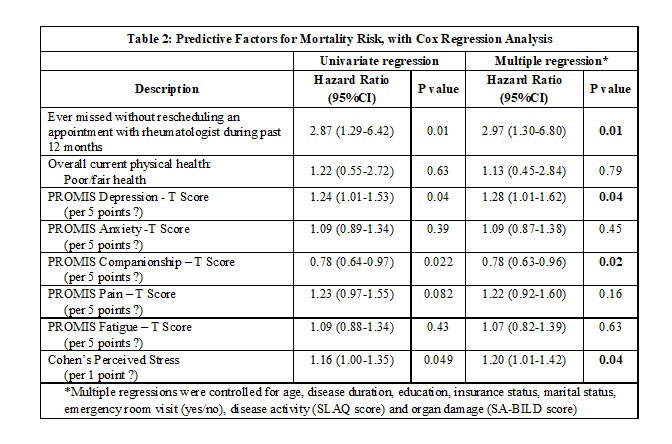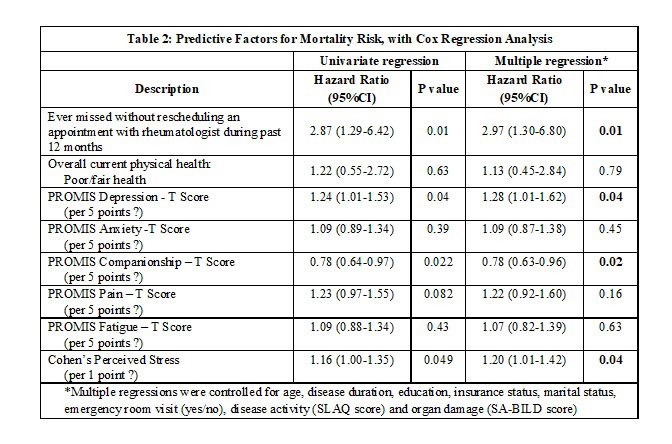Session Information
Session Type: ARP Abstract Session
Session Time: 2:30PM-4:00PM
Background/Purpose: Mortality continues to be disproportionately high in Black women with SLE living in the South region of the United States. Recent studies suggest that as in other chronic conditions, psychosocial and patient-reported health domains might have a strong influence on the mortality of people with SLE. We examined psychosocial, general health, health care access/utilization, and indicators of disease severity in relation to mortality among Black women with SLE.
Methods: We examined data from the BeWELL study. A sample of 438 self-identified Black women was recruited between April 2015 and May 2017, from the Georgian’s Organized Against Lupus (GOAL) cohort, a large population-based cohort of patients from metropolitan Atlanta Georgia with validated SLE, fulfilling 3 or more ACR classification criteria with a final diagnosis by a board-certified rheumatologist. Inclusion criteria: 18-79 years of age, and lack of significant visual or physical impairment that would prohibit being able to respond to questions on a computer. Mortality was assessed prospectively through April 2019 based on notices from family, obituaries or clinical notes. For this study, we explored the associations of the following measures: Patient-Reported Outcomes Measurement Information System (PROMIS) Companionship SF4, PROMIS Depression SF6, Cohen’s Perceived Stress Scale, the Systemic Lupus Activity Questionnaire (SLAQ) and the Self-administered Brief Index of Lupus Damage (SA-BILD). Multivariate Cox regression analysis was used to examine predictors of psychosocial and health-related factors on death, controlling for demographics, healthcare, and disease-related confounders.
Results: Twenty-four participants (mean age at enrollment = 45.5 years) died within the observation period (mean years from study entry to death = 1.3) (Table 1). Multivariate analyses (Table 2) showed that depression, perceived stress, and missed health care appointments increased the risk of death with p values ranging from 0.01 to 0.04, while perceived availability of someone with whom to share social activities was associated with lower risk after controlling for other covariates (p=< 0.02).
Conclusion: During the observation period, five percent of the sample of Black women unexpectedly died. Findings suggest that psychosocial factors, including depression, stress, and barriers to show up for medical appointments may serve as indicators of declining health and death. Companionship may be a potential protective factor, as studies have shown psychological benefits and longer life related to regular companionship.

ARPabstract_PredictiveFactorsMortalityLupus_6_04_2019_Table1

ARPabstract_PredictiveFactorsMortalityLupus_6_04_2019_Table2
To cite this abstract in AMA style:
Dunlop-Thomas C, Bao G, Drenkard C, Chae D, Lim S. Predictors of Mortality Among Black Women with Systemic Lupus Erythematosus: The Black Women’s Experiences Living with Lupus (BeWELL) Study [abstract]. Arthritis Rheumatol. 2019; 71 (suppl 10). https://acrabstracts.org/abstract/predictors-of-mortality-among-black-women-with-systemic-lupus-erythematosus-the-black-womens-experiences-living-with-lupus-bewell-study/. Accessed .« Back to 2019 ACR/ARP Annual Meeting
ACR Meeting Abstracts - https://acrabstracts.org/abstract/predictors-of-mortality-among-black-women-with-systemic-lupus-erythematosus-the-black-womens-experiences-living-with-lupus-bewell-study/
